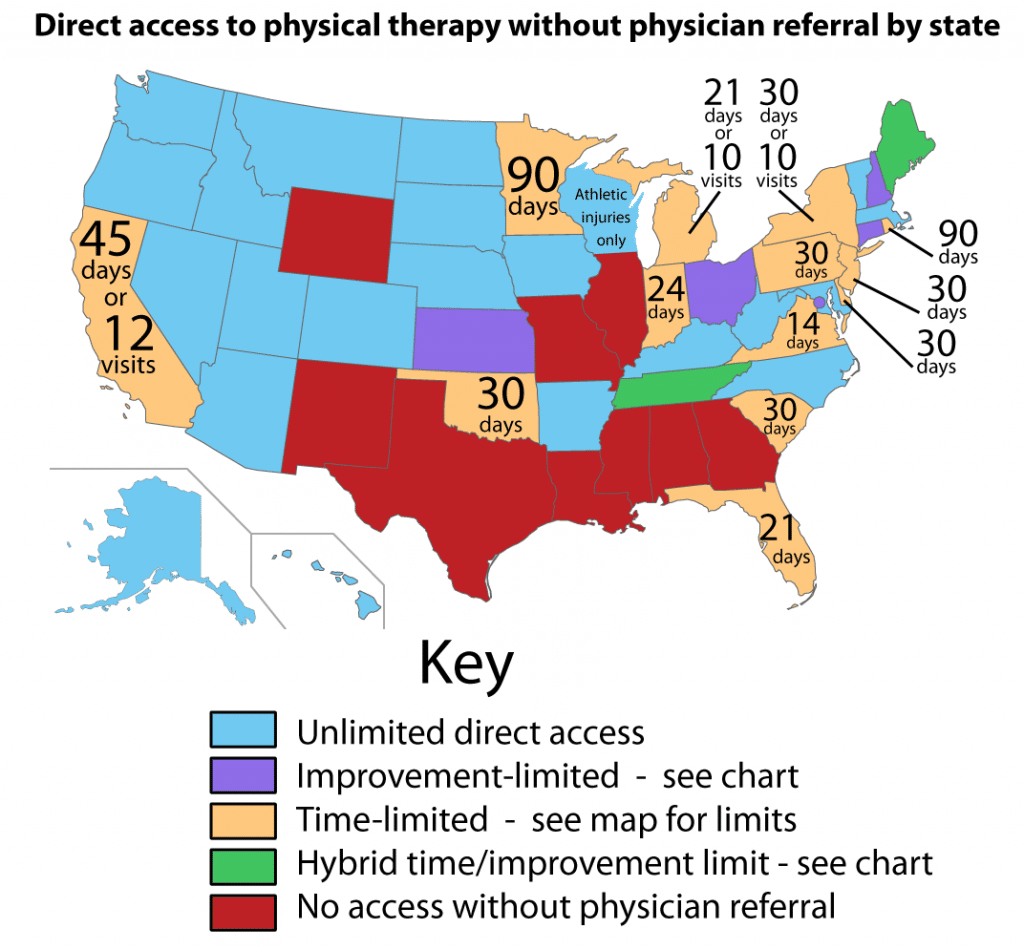There are some running injuries that are downright mysterious.
They appear out of nowhere, don’t match the symptoms of any injury you’ve ever heard of, and don’t respond quickly to time off from running.
These are the injuries that send you straight to the doctor.
Other times, it’s pretty clear what you’re dealing with, and if it’s a recurrent injury, you might even have an idea of what’s causing it.
In situations like this, you already know that the most helpful person you can see is usually a physical therapist. PTs can quickly figure out what’s wrong with your running mechanics, and figure out the right stretches, strengthening exercises, or mobility routines you need to get healthy.

Red Tape
However, to get in to see a physical therapist, there can be some arduous hoops you have to jump through.
First you might need to see your family physician to get a referral to the orthopedist or podiatrist, and then the orthopedist needs to prescribe physical therapy. This can take several weeks and cost you a lot of money in insurance co-pays.
Wouldn’t it be convenient if you could cut out the middlemen and go directly to a physical therapist if you needed to?
Can I bypass the physician?
As it turns out, this is possible, at least in some areas of the United States.
This concept—a patient being able to directly to see a physical therapist for an injury without a referral or prescription from a doctor—is known as “direct access,” and is governed on a state-by-state level.
For its part, the American Physical Therapy Association supports and lobbies for direct-access laws, while groups like the American Association of Orthopaedic Surgeons lobbies against these laws, both for obvious financial reasons.
As a result of bitter legislative battles, state regulations vary considerably.
Though there are compelling arguments for both sides of this debate, the politics of this are probably not of much interest to you as a runner; all you want to know is whether your state allows you to see a physical therapist without a diagnosis or referral from a physician, and what restrictions, if any, are put on your treatment.
After a bit of research, I’ve created a map and two accompanying charts that detail how the laws would apply to a runner with a new injury for each of the fifty states.1
Broadly speaking, there are four categories.

Runner Friendly
First are the states—twenty-two in all—that have no restrictions on direct access.In these, you can see a physical therapist as often as you want for as long as you want.
There are a few wrinkles: Wisconsin, for example, does not permit direct access for most purposes, but makes a special exception for athletic injuries. How convenient!
A few other states prohibit specific treatments, like spinal manipulation or molding custom orthotics without a referral, but that’s about it.
Thirteen states allow you to seek physical therapy without a referral for a set amount of time. These kinds of restrictions were probably designed to prevent unscrupulous therapists from stringing along injured patients for months at a time without the supervision of a doctor.
At one extreme, Virginia permits only fourteen days of treatment without a referral, while at the other, Minnesota and Rhode Island allow ninety days.
Runner Limitations
Some states also set a limit on the number of visits, too, so you can’t cram in as many PT sessions as possible during the allotted time. States that are time-limited are labeled on the map with the number of days or visits allowed.
Five states allow direct access to physical therapy, but only if you improve “significantly” during the course of treatment. The time span for how long you have to demonstrate said improvement is usually a set number of visits or a set number of days after starting treatment, whichever comes first.
The specifics for each state is laid out below
| States with improvement-limited direct access to physical therapists | |
| State | Stipulations |
| Connecticut | Must seek referral if no improvement after 30 days or 6 visits, whichever comes first |
| District of Columbia | Must seek referral if no improvement after 30 days |
| Kansas | Must seek referral if no improvement after 15 business days or 10 visits, whichever comes first |
| New Hampshire | Must seek referral if no improvement after 25 days |
| Ohio | Must seek referral if no improvement after 30 days |
Maine and Tennessee use a hybrid system which employs both a time limitation for total treatments without referral and a requirement that you show significant improvement within a shorter period of time. The specifics of these requirements are laid out in the second chart.
| States with hybrid time/improvement-limited direct access to physical therapists | |
| State | Stipulations |
| Maine | Must seek referral if no improvement after 30 days or 120 days of treatment |
| Tennessee | Must seek referral if no improvement after 15 days or 6 visits, whichever comes first or 30 days of treatment |
Runner Road Block
Finally, nine states effectively prohibit access to physical therapy without a diagnosis or referral from a physician, at least for new injuries. A couple of these states have exceptions for injuries diagnosed and referred for physical therapy in the past few months or year, but still don’t allow direct access for new injuries.
Conclusion
It should be noted that in any state, a physical therapist must refer you to a doctor if you have an injury or a condition that’s outside of their ability to treat or diagnose.
Even if your state allows direct access, you might want to talk to your health insurance company to make sure they will reimburse you for your physical therapy sessions first.
Going in to physical therapy directly, without first seeing a doctor, isn’t always the right choice, but it can be very convenient in some situations.
Direct access, depending on where you live (or where you’re willing to travel to), can be one more tool in your toolbox for overcoming running injuries.
What has your experience been with seeing a physical therapist?




